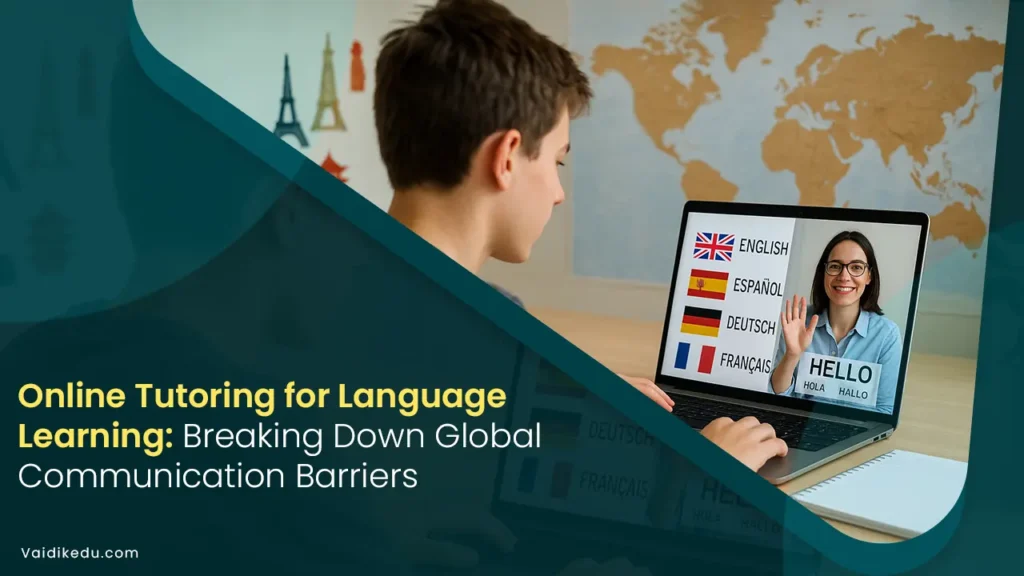In today’s world, language is not a skill, it’s a gateway that binds people together, builds relationships, and leads to new opportunities. But for too many, acquiring a second language appears daunting, expensive, or impossible.
And let’s be honest, traditional classroom methods aren’t practical for everyone. Restrictive schedules, distracting settings, and generic teaching tend to fail.
That’s where online tutoring quietly started to change the game. There are no flashy slogans, no overnight miracles, just real people helping other real people learn, grow, and communicate.
Whether it’s a working mom brushing up on her English after the kids are asleep or a college student in India learning German from a native tutor in Berlin, online tutoring has become a silent revolution in language learning.
This blog explores how online tutoring isn’t just teaching people new words, it’s breaking down barriers. It’s making the world feel a little smaller, a little kinder, and a lot more connected.
The Rising Importance of Language Learning in a Globalised World
Think about how often we interact with someone from a different country without realising it. Maybe it’s a customer service chat with someone based on another continent.
Perhaps it’s buying a handmade product from an artist overseas. Or maybe it’s just scrolling through Instagram and seeing captions in five languages. We’re more globally connected now than ever before, and with that connection comes the growing need to understand each other.
Language acquisition is no longer an activity students engage in at school or an additional ability one acquires if you’re going to emigrate. It’s a life skill now. Whether in business, medicine, teaching, or even social media, speaking more than one language isn’t just cool, it’s necessary.
For instance, a Spanish-speaking digital marketer can access a new market. An English-speaking and Tagalog-speaking nurse could establish greater trust with her patients. The options are limitless.
And it’s not just about career growth. On a personal level, learning another language gives you the keys to understanding another culture. You don’t just learn words, you learn ways of thinking, humour, traditions, and values.
You gain empathy. You become more open. And in a world where misunderstandings can escalate quickly, that kind of human connection matters more than ever.
It’s also worth mentioning that being multilingual can strengthen your brain. Studies show that language learners often have better memory, sharper focus, and more mental flexibility.
But even without the science, anyone who’s tried learning a new language can tell you it challenges you. It humbles you. It makes you pay attention in a way few other things do.
How Online Tutoring is Breaking Communication Barriers
Let’s face it, language barriers have always been tricky. They don’t just cause misunderstandings; they can make people feel excluded, awkward, or even invisible in conversations.
Whether missing out on a joke, struggling to understand directions, or hesitating to speak in a meeting, the inability to communicate freely can quietly hold people back.
But here’s where online tutoring steps in not just as a tool for learning grammar or memorising vocabulary, but as a gentle, ongoing effort to build confidence and connection.
The true magic of online tutoring is its human factor. You’re not mastering a language; you’re engaging with a human who already knows the language fluently, who can clarify nuances of meaning, correct your pronunciation, and assist with those little cultural differences that texts can’t cover. It’s not word-for-word translation, it’s learning how people communicate.
Take, for example, someone learning English from a small town in Brazil. They may have studied English in school, but never had the chance to speak it with a native speaker.
They practise honest conversations with someone in London or New York through online tutoring. They’re learning not just what to say, but how to say it when to be formal, when to use slang, and how to ask for clarification politely. That’s not just educational, it’s empowering.
And then there’s the fact that borders don’t limit online tutoring. Someone in Japan can learn Spanish from a tutor in Mexico. A Syrian refugee in Germany can find an Arabic-speaking tutor who helps them learn German for their new life.
A student in Africa can get one-on-one help in French from someone in Paris. Suddenly, communication doesn’t feel like a wall but like a door.
What’s also beautiful is the way tutors often become cultural ambassadors. They also share their culture in teaching someone their language, festivals, humour, customs, and perspectives. These little exchanges chip away at stereotypes and build mutual respect. You begin to see the world in translation and through someone else’s eyes.
And let’s not forget about accessibility. For people with disabilities, mobility issues, or those living in remote areas with no language centres nearby, online tutoring can be a lifeline. You only need an internet connection and a device, and you’re connected to the world.
In a world often divided by differences, online language tutoring quietly builds bridges one lesson at a time, one conversation at a time. It breaks down communication barriers not by erasing them but by helping us climb over them together.
Personalised Learning: The Key To Better Language Acquisition
If you’ve ever tried learning something, you’ll know that how you learn matters as much as what you’re trying to learn. Some people can absorb information just by reading it.
Others need to hear it out loud. Some prefer visuals. Some need to write things down physically. That’s just how our brains work; we’re wired differently.
Imagine trying to learn a new language, but the method doesn’t suit you. It’s like trying to run a race in shoes that don’t fit. You’re constantly uncomfortable, constantly second-guessing yourself, and eventually, it just becomes easier to give up.
That’s the trap so many people fall into with traditional language learning and it’s precisely what online tutoring is helping to fix.
One of the most significant advantages of online tutoring is how deeply personal it can be. This isn’t a one-size-fits-all system. You’re not just a student sitting at the back of a classroom. You’re you, with your own goals, struggles, and pace. A good online tutor sees that right away.
They ask you what you want to focus on. They pick up on the way you respond to corrections. They notice when you light up because something clicks, and gently slow down when they sense confusion.
Maybe you’re someone who learns better through conversation. Great, your tutor can make your sessions more dialogue-focused. Perhaps you like structure and need clear rules perfectly, your tutor can provide grammar breakdowns and written notes.
Maybe you’re shy and hate speaking at first. They’ll ease you in with patience and kindness. That level of personalisation simply isn’t possible in a crowded, standardised classroom.
There’s also the ability to switch up your learning course mid-stream. You can hone in on vocabulary, move to pronunciation, and then move on to reading comprehension or writing exercises.
You’re not tied into a set syllabus, you’re on a learner’s journey that adapts with you. And that adaptability keeps you engaged, because you’re never stuck doing something that isn’t working for you or makes you want to pull your hair out.
Another underrated benefit? Immediate feedback. You don’t have to wait for a teacher to mark your assignment a week later. Your tutor can gently correct your sentence as you speak it, explain why it’s wrong, and help you say it better. That real-time correction helps your brain create strong language habits from the very beginning.
At the heart of it all, personalised online tutoring makes language learning feel less like a subject and more like a conversation with a guide who genuinely wants to help you grow.
And when you feel understood, supported, and seen as a unique learner, something shifts. You become more confident, curious, and willing to take risks in the language. That’s where real progress happens not in perfection, but in the space where learning feels like yours.
Global Access, Local Comfort: Learning From Anywhere
There’s something oddly comforting about learning in your own space. Maybe it’s your favourite chair, you’re in pajamas, a cup of tea on the table, and your pet snoozes beside you.
You’re not rushing across town to make it to class on time, or sitting under flickering fluorescent lights in a cold classroom. You’re home or at least in a place that feels like it.
One of the underrated joys of online tutoring is the freedom to learn wherever you are without sacrificing the comfort of your environment.
In the past, if you wanted to learn a language, you were tied to what was available locally.
If there wasn’t a good language school nearby, or the class times didn’t work with your schedule, you were out of luck. And even if there was a class, you didn’t always have a say in who your teacher was, or if their teaching style worked for you.
Online tutoring changed all of that. Now, your classroom is your laptop. Or your tablet. Or even your phone. You can sit in a quiet corner of a café in Delhi, a dorm room in Toronto, or your living room in Nairobi and still learn French from a tutor in Paris, or Japanese from someone in Tokyo. The world is quite literally at your fingertips.
But it’s not just about convenience. It’s about access. Think of people who live in rural areas, where resources are limited. Or students with mobility challenges who can’t easily commute.
Or busy professionals and parents who simply don’t have the bandwidth to attend regular in-person classes. Online tutoring opens doors for them that might otherwise stay closed.
And then there’s the emotional comfort. For many people, speaking a new language out loud is intimidating. You worry about sounding silly, making mistakes, and being judged.
But when you’re learning from your own space, with a kind and patient tutor, those nerves soften. You’re not performing for a group, you’re just conversing. Slowly but surely, your confidence grows.
Online tutoring brings the global experience of language learning into your local world. It doesn’t force you to go somewhere else, it meets you where you already are. And that simple shift knowing in your comfort zone while connecting with someone across the globe can make all the difference.
Conclusion
Language is more than words; it’s the key to unlocking new friendships, opportunities, and perspectives. In today’s connected world, the ability to communicate across cultures is becoming essential. Online tutoring has become a game-changer, tearing down the walls that once made language learning tough or out of reach for many.
What’s unique about online tutoring isn’t convenience or technology, it’s how it brings humans together, regardless of location. It transforms strangers into dialogue companions and far-off instructors into individual mentors. It is tailored to your needs and accommodates your schedule, not vice versa.
Frequently Asked Questions
Yes, absolutely. Online tutoring offers personalised, one-on-one attention that traditional classrooms often can’t. You get to learn at your own pace, focus on the areas you struggle with, and practice speaking with real native or fluent speakers. Plus, with tools like video calls, screen sharing, and language apps, the experience is very interactive.
Start with your goals. Are you learning for travel, work, or just for fun? Once you’re clear on that, look for a tutor who aligns with your needs someone who teaches in a style that works for you and offers a comfortable, supportive vibe. Trial sessions can help you figure that out before committing.
Absolutely! Some tutors specialise in teaching children or complete beginners, using fun, visual methods and games to make learning engaging. Online platforms often let you filter tutors based on age group and experience level.









